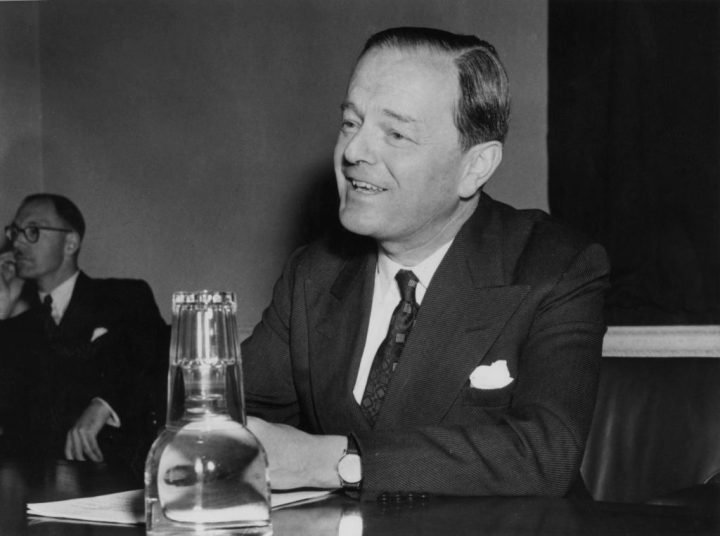‘What is Civilisation? I don’t know. I can’t definite it in abstract terms – yet. But I think I can recognise it when I see it; and I am looking at it now.’ So suggested Kenneth Clark, looking towards Notre Dame at the start of Civilisation, his magisterial televisual guide through Western art, architecture, and philosophy. From the ruins of a ravaged Roman Empire to the skyscrapers of modern New York City, the series covers Clark’s ‘personal view’ of the development of European civilisation. Now, more than fifty years since its creation, the BBC has decided its viewers need protecting from this ‘personal view’.
First broadcast in 1969, Civilisation was the BBC’s first ambitious documentary series in colour. Costing £500,000 to produce, it proved a hit on both sides of the Atlantic, introducing millions to Clark’s insightful charm. Director of the National Gallery by the age of 30, Clark then made a surprise career move to head up the nascent ITV, making him perfectly quipped to write and present the 13-part epic.
Coming to Civilisation mid-lockdown, I found it the perfect guide for a cultural novice. From Chartres to Constable, Bruni to Beethoven, Clark’s sweeping grasp is as much a masterpiece as any of his chosen subjects. It seemed like good news then to discover that the BBC was broadcasting Civilisation again for the first time in over a decade. What is less delightful was the snobbish note that now accompanies the series on the BBC website. It suggests the programme does not necessarily accord with Auntie’s current ‘standards and attitudes’, and further undermines it by placing alongside it a new segment by Mary Beard lamenting the ‘posh’ Clark’s Euro-centrism.
The former can be begrudgingly accepted, since it has previously been applied to other programmes from the BBC archives, including an interview with Martin Luther King Jr. But the latter sticks in the craw. Although Beard praises Civilisation and makes clear its personal importance to her, one can’t help but feel that Britain’s best-known classicist is being unfair to Clark’s tour-de-force.
Beard co-starred in a 2018 sequel entitled Civilisations, which took the focus outside of Europe. It is not surprising that Beard suggests in her new introduction that the programme gives her a ‘sense of unease’ with its ‘cult of Clark’ take on art history, or when she implores viewers to ask Clark’s ghost if he has ‘noticed if the rest of the world exists’ as they watch. ‘He doesn’t even go to Spain!’ she complains.
Her criticisms are not unreasonable. A history of human art that doesn’t venture below the Pyrenees cannot claim to be comprehensive. But the clue to Civilisation’s success lies in its subtitle: A Personal View. Clark did not aim to be definitive or radical, but merely strove to bring the delights of the Western canon to the telly-watching masses in his own amiable way. Judged by this metric, it was, and is, a total triumph.
By contrast, Beard’s Civilisations failed to replicate Clark’s success through its unwillingness to differentiate between civilisation and culture. Pretending pre-historic stonework can rival Michelangelo is an obvious nonsense, especially if delivered with a slight air of snobbish condescension.
The same cannot be said of Clark: a committed egalitarian who would open the National Gallery early on FA Cup final days in the hope that visiting fans would pop in before the match. He didn’t share the cask strength politics of his Conservative son, believing Labour’s election in 1945 was one of the greatest things the English ever did. But his real inspiration was still a Tory: John Ruskin.
Reading the Victorian critic had convinced Clark that art should be accessible to everyone. Civilisation was the embodiment of his life’s work. It never talks down to its viewers. Clark contentedly left minutes devoid of commentary, allowing those watching to bask in the magnificence of whichever cathedral or piece of music he had chosen. You are free to enjoy the beauty without interruption.
Although ambivalent about those at the top of power, from the ‘panic and fatigue’ of Versailles to the ‘ignorant’ elites of pre-war Europe, Clark wholeheartedly believed in individual genius and Christianity’s role as ‘the chief creative force in western civilisation’. Neither is in vogue today. Looking at the monstrosities that litter our cities and galleries, one can’t help but find Clark’s traditionalism appealing.
At the end of the series, Clark maintains that is ‘a lack of confidence, more than anything else, that kills a civilisation’. A national broadcaster that feels challenged enough by a fifty-year old programme not to let it air without some form of warning or lecture cannot be said to be that. But as Civilisation proves, great art endures, even as fashions shift – and idle posturing can never substitute for good taste.








Comments